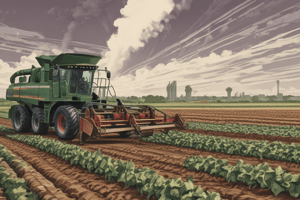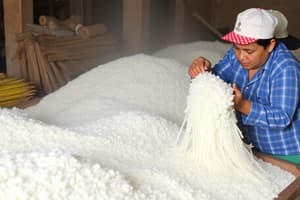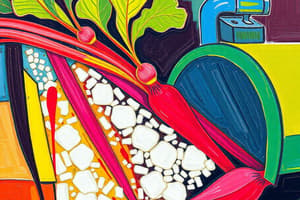Podcast
Questions and Answers
What process was first developed in India around AD350 to create sugar?
What process was first developed in India around AD350 to create sugar?
- Chewing sugarcane to extract juice
- Mixing sugar with other food ingredients
- Crushing, boiling, and drying the cane juice (correct)
- Using honey as a sweetener
What was the primary sweetener used in the Islamic world before the introduction of sugar?
What was the primary sweetener used in the Islamic world before the introduction of sugar?
- Honey (correct)
- Molasses
- Agave nectar
- Maple syrup
By the eleventh century, where was sugar cane being cultivated?
By the eleventh century, where was sugar cane being cultivated?
- In North Africa and Spain (correct)
- Only in Spain
- In the Arabian Peninsula only
- Only in India
Which method was developed by farmers to manage water for sugar cane cultivation?
Which method was developed by farmers to manage water for sugar cane cultivation?
What is the significance of the period from AD 632 to AD 750 regarding sugar in the Islamic world?
What is the significance of the period from AD 632 to AD 750 regarding sugar in the Islamic world?
Which geographical locations were reached by the expansion of Islam by AD750?
Which geographical locations were reached by the expansion of Islam by AD750?
In addition to producing sugar, what was another advancement made by farmers during its cultivation?
In addition to producing sugar, what was another advancement made by farmers during its cultivation?
What initially stimulated the Islamic world's interest in sugar?
What initially stimulated the Islamic world's interest in sugar?
What was the primary factor that led the Portuguese to eventually use slavery in their sugar plantations?
What was the primary factor that led the Portuguese to eventually use slavery in their sugar plantations?
Which nation emerged as the largest slave trading nation by the end of the 17th century?
Which nation emerged as the largest slave trading nation by the end of the 17th century?
In the context of the triangular trade, what was the primary commodity traded from Africa to the Americas?
In the context of the triangular trade, what was the primary commodity traded from Africa to the Americas?
What was the significance of the journey from Africa to the Americas known as the 'Middle Passage'?
What was the significance of the journey from Africa to the Americas known as the 'Middle Passage'?
Which process was primarily established by the English during the 16th century in the Caribbean?
Which process was primarily established by the English during the 16th century in the Caribbean?
What were the manufactured goods sent to Africa in exchange for enslaved people typically comprised of?
What were the manufactured goods sent to Africa in exchange for enslaved people typically comprised of?
What motivated England's involvement in sugar production during the 16th and 17th centuries?
What motivated England's involvement in sugar production during the 16th and 17th centuries?
What was the relationship between the raw materials traded from the Americas and the manufactured goods sent to Europe?
What was the relationship between the raw materials traded from the Americas and the manufactured goods sent to Europe?
Flashcards are hidden until you start studying
Study Notes
Origins of Sugar
- Sugar is derived from sugarcane, a tall plant that thrives in warm climates.
- Initially, people consumed sugarcane by chewing it for its sweet juice.
- Around AD 350, Indian innovators began producing sugar crystals by crushing, boiling, and drying the sugarcane juice.
Sugar in the Islamic World
- Following Prophet Muhammad's death in AD 632, Islam expanded significantly, reaching from Spain to India by AD 750.
- Prior to the introduction of sugar, honey was the primary sweetener in the Islamic world.
- The introduction of sugar from India revolutionized sweetening practices in the region.
- By the eighth century, sugar cane cultivation began to spread throughout the Islamic territories.
- By the eleventh century, sugarcane was being cultivated in North Africa and Spain.
- Advancements in irrigation methods were made to support sugar cane farming, along with the construction of watermills for sugar processing.
Sugar Trade Changes
- Trade routes expanded as sugar farming spread, enhancing cultural exchanges.
- Increased sugar production led to the establishment of trade networks throughout the Islamic world.
Sugar Production and Consumption
- Sugar was produced primarily by farmers in regions like North Africa, Spain, and parts of the Middle East.
- The sweetener was widely consumed in various forms, enhancing the culinary landscape of the Islamic world.
Origins of Sugar Plantations
- Early attempts by the Portuguese to recruit labor for plantations failed.
- Transitioned to forced slavery, with over 200,000 Africans captured and transported to Brazil and the Caribbean by 1600.
English Involvement in Sugar Production
- England's involvement in sugar and slave trade grew significantly over the next century.
- During the 16th century, the English seized several Caribbean islands from Spain, establishing sugar plantations.
- In 1625, English colonies were also founded in North America, utilizing enslaved labor for plantation work.
The Rise of the Transatlantic Slave Trade
- The transatlantic slave trade commenced around 1650, intensifying through the late 17th century.
- By the end of the 1600s, thousands of Africans were being forcibly shipped to the Americas annually.
- Britain emerged as the leading nation in the global slave trade.
The Triangular Trade Route
- The "triangular trade" outlines the exchange pattern in the Atlantic slave trade:
- Europe to Africa: Trade of manufactured goods for enslaved Africans.
- Africa to the Americas: Transfer of enslaved Africans in return for raw materials, particularly sugar.
- Americas to Europe: Shipment of raw materials back to Europe for more manufactured goods.
- The "Middle Passage," the sea journey from Africa to the Americas, was notoriously brutal and inhumane.
Studying That Suits You
Use AI to generate personalized quizzes and flashcards to suit your learning preferences.




